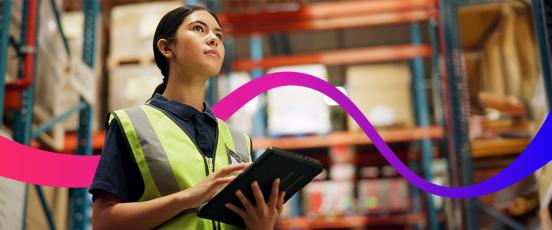Ensuring compliance in construction: top tips and strategies for success

Industries that operate on multiple sites or have mobile workers such as construction have additional challenges when it comes to maintaining compliance.
What is compliance in construction?
Compliance is a catch-all term for laws, regulations and industry standards that cover someone’s legal obligations within any given sector. This can include environmental standards, safety standards, ethics and building codes.
Compliance is a complex, time-consuming and expensive task for any industry, but few more so than construction. This is especially true with mobile workers in trying to ensure you always inform all your employees about the latest compliance regulations, where you can’t easily report or track their actions.
Key regulations governing construction compliance
One of the most critical regulations for construction companies to consider at the moment is the Building Safety Act of 2022. This is designed to improve building safety standards, mostly through strengthening the existing regulatory framework. From an HR perspective, there are new roles to consider and hire for (such as the role of Principal Accountable Person), as well as new reporting standards. Data hygiene is also vital.
We’re also seeing an emphasis on new environmental regulations. For example, the Future Homes Standard is intended to make new homes zero-carbon ready.
More general compliance standards still apply, such as the 1974 Health and Safety at Work Act and the 1998 Provision and Use of Work Equipment Regulations, so keeping on top of any changes in these areas remains important. Communicating those standards and ensuring they’re being followed should be a key part of your training.
Importance of compliance in construction projects
Why is it important to ensure compliance? If your employees forget or don’t understand any compliance changes, it leaves your organisation open to breaches, resulting in fines, penalties, and even being named and shamed by the government, damaging your potential growth and future recruitment opportunities.
Regulations are in place to keep your employees safe at work, help build and maintain trust with employees and clients, enhance consistency and prevent unforeseen errors.
Strategies for ensuring compliance in construction
To combat these challenges associated with compliance breaches, we’ve pulled together three top tips to ensure you’re always up to date, no matter where your employees are based.
1. Implementing effective policies and procedures
With employees at different locations, it can be difficult to keep track of who has knowledge of policies and if they are being enforced. Using software that sends and tracks employee policy documents and their engagement can help ensure your employees’ knowledge is up to date with the latest information.
Keep your employees aware of requirements regarding their job and give them the opportunity to refer to the relevant policies when they are on-site, giving them confidence that they are doing their job in line with the latest regulations. This allows you to trust that all your sites are running consistently in line with the latest regulations and your employees are safe.
Our HR and payroll solutions allow employers, managers and supervisors to see, share and track policy documents with their teams to ensure employees have read and understood the latest compliance changes, giving you confidence that your risks are reduced.
2. Real-time reporting
Payroll software with real-time reporting is critical, due to the flexibility and time and cost savings involved. Manual processes such as paper timesheets are time-consuming and expensive, costing organisations £1,500 a year per employee.
This is even worse across multiple sites where these processes might differ and take time to collate. Repetitive data entry into multiple systems can be a tedious and repetitive task, causing human error and resulting in employees distrusting their employer.
Real-time reporting creates a seamless data stream from employee devices on their different sites straight to payroll. This seamless automated stream also decreases data breaches as there are no paper timesheets with employee details that could be misplaced or lost, helping to keep your company GDPR compliant. Real-time reporting also helps to avoid fines from HMRC as payroll is accurate and on time.
Our software allows employees to clock in and out using their mobile phones, tablets or computers anywhere and anytime. Data is then sent straight to payroll to wait for approval. Using an employee location service, you can see where they clocked in and out, preventing time fraud.
Companies that are currently using manual processes lose as much as 7% of their profits due to time fraud. This is often because employees get their timesheets in last minute, struggle to remember and often estimate (or purposely add on extra time) on their timesheet.
3. Building a culture of compliance
Having a training programme that employees can access on any device, anywhere and anytime is essential for organisations working on multiple sites to ensure all employees have access to the training programmes they need, regardless of location. Educating your employees on the laws and regulations applicable to their job and industry helps maintain safety on-site, minimise risk, provide a better environment for your employees to work in, and maintain your organisation’s reputation – increasing productivity in the long run.
With People First Learning, you can transform the way your workforce learns and understands compliance. It gives you the ability to easily create, manage, and organise your own learning, compliance, enablement, and user-adoption materials specifically for your employees’ jobs. New compliance changes? No problem, our learning suite allows you to edit and update learning content with the latest regulations.
Once you have created your compliance materials, you can measure the effectiveness from a single dashboard. This allows you to manage your employees' progress and see what works best for them, through materials such as gamification and quizzes. Then you can tailor future material in a way that gets the best results from your employees.
New technologies are vital for ensuring training is up to standard and that data is managed in a way that meets your compliance obligations. People First comes equipped with a huge range of tools, from integrated learning features to effective workforce management, all of which will help you stay on top of this vital part of your day.



